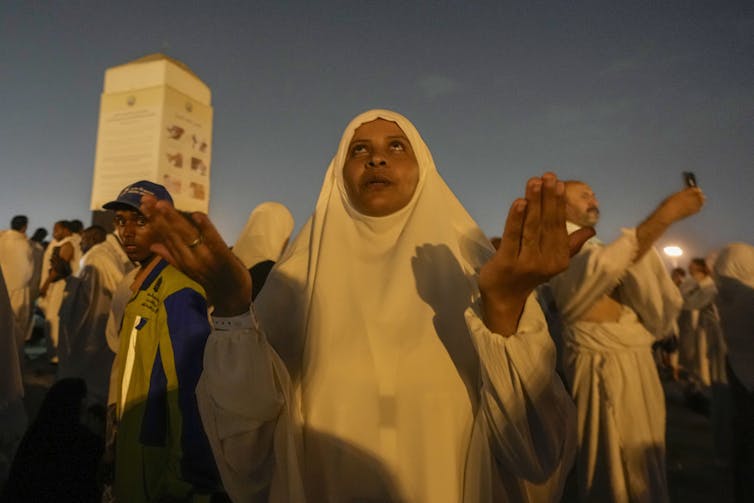Hajj in extraordinary heat: What a scholar of Islam saw in Mecca
Ahmet T. Kuru, San Diego State University, The Conversation
At least 1,300 people died because of scorching heat during the Hajj pilgrimage in June 2024. It’s not the first time that such a tragic incident hit the pilgrimage. More than a thousand were killed in a heat wave in 1985, and deaths due to stampedes and other crowd-related disasters have been reported in previous years.
But despite the risks, millions of Muslims perform the pilgrimage; this year alone, some 1.8 million participated in it.
I, too, performed Hajj this year by traveling from the United States to Saudi Arabia. This not only allowed me to fulfill my religious duty as a Muslim, but it also gave me the opportunity to observe the diversity of Muslim societies as a social scientist studying Islam and politics.
While the tragic deaths came to be the focus of much of the media coverage, there were many other dimensions of Hajj 2024. Hajj is a personal spiritual journey that also involves meeting Muslims from diverse backgrounds. But, of late, the Saudi government’s management of this gathering has been criticized, particularly regarding its destruction of Mecca’s historical landscape.
Religious significance
Hajj is one of the five pillars of Islam – together with declaration of faith, daily prayers, fasting and almsgiving. Muslims who have the financial and physical ability to undertake the pilgrimage are obligated to perform it at least once in their lives.
During most of the Hajj rituals, men wear two pieces of unstitched white clothing, representing humility and equality, while women can wear any articles of modest dress. Together, men and women walk seven times around the Kaaba – the cube-shaped structure believed to be the “house of God” in Mecca. Muslims all over the world turn toward the Kaaba when they pray five times a day.
Hajj has many spiritual dimensions, such as contemplation and asking for forgiveness and supplication, but it also involves physical challenges. For example, an essential requirement of Hajj is traveling to Arafat, which is about 15 miles (24 kilometers) from the Kaaba, for a daylong prayer.
Physical challenges also include sleeping in tents in Mina, which is about 5 miles (8 kilometers) from the Kaaba, for three to four days. Pilgrims must also remain under the open sky in Muzdalifah, a place about 8 miles (13 kilometers) from the Kaaba, for a night.
Traveling to all these places, in addition to performing rituals in Mecca, entails a substantial amount of walking. I calculated walking about 80 miles (129 kilometers) during my pilgrimage. And this year’s extreme heat added to the challenge.
Multiracial global Islam

Hajj reflects the racial and socioeconomic diversity of about 2 billion Muslims across the world. Hajj’s significance regarding racial relations was famously articulated by Malcolm X, a leading African American activist and intellectual.
Malcolm X’s Hajj in 1964 played a major role in his transformation from being a Black nationalist to adopting the mainstream Islamic notion of embracing all races. In a letter to his followers, Malcolm X explained how his interactions with white pilgrims were very positive: “There are Muslims here of all colors and from every part of this earth. … I could look into their blue eyes and see that they regarded me as the same (Brothers), because their faith in One God (Allah) had actually removed ‘white’ from their mind.”
This year, pilgrims came to Hajj from 180 countries, where diverse Islamic schools of theology and law have been practiced.
It is difficult to differentiate between pilgrims following Sunni, Shiite or other interpretations of Islam, since there are no substantial differences between their Hajj rituals. I had conversations with pilgrims from the U.S., Norway, Finland, Albania, Turkey, Mali, India, Malaysia and Indonesia without knowing their religious schools.
Nonetheless, one can still observe some differences. During the circling around Kaaba, for example, I saw a dozen Iranians reciting out loud “Jawshan”– a prayer book of Shiites rarely embraced by Sunnis.
Critical perspectives
Islamic scholars generally encourage pilgrims to focus on personal devotion and the rituals. But this cannot prevent some pilgrims from criticizing the Saudi government’s management of Hajj, including its attempts to commercialize this devotional gathering.
In his 2014 book based on his multiple pilgrimages, British Muslim intellectual Ziauddin Sardar critiques how the Saudi government destroyed historical tombs, shrines and other buildings in Mecca, replacing them with towering hotels and malls, including the Clock Tower, the world’s fourth-tallest building. The Clock Tower is located right next to the Kaaba and dwarfs the sacred structure.
The Saudis’ destruction of historical buildings in Mecca was based on their fear that these historical sites, rather than God, would become objects of worship. As a result, no historical buildings remain in Mecca except Kaaba.
Interestingly, the House of Saud seems to have finally recognized the error of its ways. In both Mecca and Madina, I saw recently opened museums, signaling a new attitude toward historical preservation.
However, many pilgrims disregard these problems and concentrate on the spiritual dimension of their journey. Hajj is a unique experience allowing one to meet and even live together with people from radically diverse backgrounds. It reflects the racial, ethnic and socioeconomic diversity of the global Muslim community. And this year even the extraordinary heat couldn’t prevent it.
Ahmet T. Kuru, Professor of Political Science, Director of Center for Islamic & Arabic Studies, San Diego State University
This article is republished from The Conversation under a Creative Commons license. Read the original article.
The views expressed in this opinion column are those of the author and do not necessarily reflect the views of FāVS News. FāVS News values diverse perspectives and thoughtful analysis on matters of faith and spirituality.






